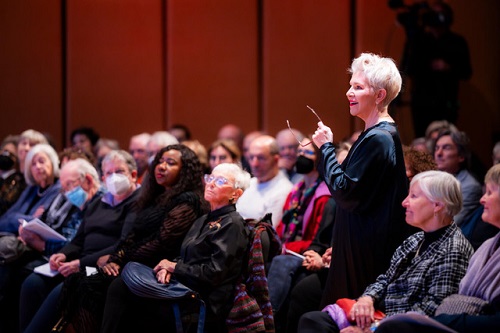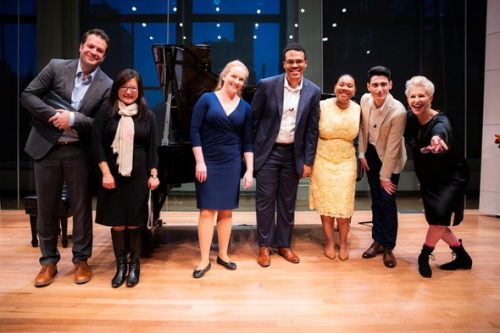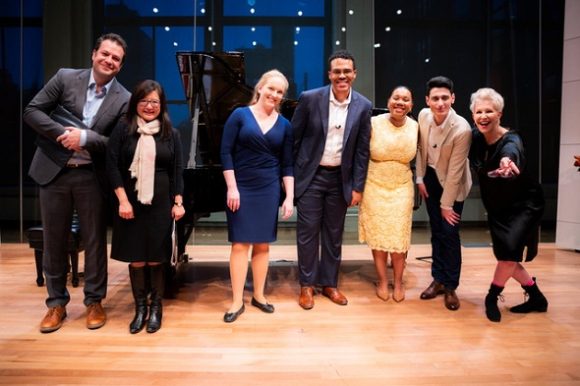 United States Various, ‘Joyce DiDonato Master Classes’: Jazmine Saunders (soprano), Karen Mathilde Heier Hovd (mezzo-soprano), Agustin Pennino (countertenor), Travon D. Walker (tenor), Joel Harder, Justin Lee (piano). Weill Music Institute, Carnegie Hall, New York, 24.10.2023. (RP)
United States Various, ‘Joyce DiDonato Master Classes’: Jazmine Saunders (soprano), Karen Mathilde Heier Hovd (mezzo-soprano), Agustin Pennino (countertenor), Travon D. Walker (tenor), Joel Harder, Justin Lee (piano). Weill Music Institute, Carnegie Hall, New York, 24.10.2023. (RP)

Verdi – ‘Ah, fors’e lui . . . Sempre libera’ (La traviata)
Handel – ‘Il tuo sangue’ (Ariodante)
Haydn – ‘Se lo comanda’ (Il mondo della luna)
Gluck – ‘Che farò senza Euridice’ (Orfeo ed Euridice)
Arriving for Joyce DiDonato’s final master class with some time to spare, the first thing that struck me was that the Weill Music Room in Carnegie Hall’s Resnick Education Wing was packed. No doubt a significant number were there because they wanted to learn, but undoubtedly some came because DiDonato has just finished a run as Sister Helen Prejean in Jake Heggie’s Dead Man Walking at the Metropolitan Opera (review here). New York cannot seem to get enough of her and all that she has to offer at the moment.
DiDonato’s focus in these masterclasses is opera, and some of the repertoire is a tricky thing to work on with singers as young as this year’s participants. A great voice, talent and ambition are the givens, but there are a host of variables at play. The difference of a year or two in age can be a huge factor in terms of just about anything with singers in their early twenties.
But, as DiDonato says every year, these master classes are about the process. She is great at meeting singers where they are at this moment in their development. Her goal is to try and help them find the path to their dreams, and if that means doing lip trills on the floor with countertenor Agustin Pennino, she runs with it.
Not being at the first two sessions meant that I missed a lot of the process. You do, however, immediately get an idea of the rapport and trust that DiDonato has established with the singers. It is hard enough to be receptive to new ideas while being on public display, let alone the types of curveballs that DiDonato tosses from time to time. The four singers proved to be quick and responsive, obviously having checked any sense of vulnerability at the door.

DiDonato has a remarkable ability to zero in on what she can bring to the equation in the scant time allotted to each singer. For soprano Jazmine Saunders, it was exploring ‘È strano!’, the first two words of Violetta’s aria from Verdi’s La traviata, ‘Ah, fors’e lui … Sempre libera’. DiDonato started Saunders on the path to expressing the impact that Alfredo’s rash expression of love had on Violetta by reminding both singer and audience that they may know the end of the story, but the character does not. DiDonato sensed a kindred spirit in the young soprano, spotting a fellow perfectionist in her. It is an admirable trait, but DiDonato advised the younger singer not to let it stand in the way of exploring new approaches and just living in the moment.
With tenor Travon D. Walker came repertoire in which DiDonato has triumphed. Before he even sang a note of ‘Il tuo sangue’ from Handel’s Ariodante, she quipped that her contracts should have stipulated that she be paid by the number of notes in a role rather than per performance. Therein lies the challenge for a singer, making each run and repetition of text fresh and interesting for the listener.
For DiDonato that means finding a new color for each turn of phrase, and she had Walker sing them in jazz mode. A newly-found sense of swing and freedom was the result, as appropriate in Handel as it is in Duke Ellington. DiDonato reminded him that he wasn’t the only person on stage, and that it is essential to engage other characters in conversation to make it real. In this case, it was cajoling a king into doing the right thing, and Walker proved to be very persuasive.
Saunders and Walker both said that the arias they sang were new to them. That was not the case for Karen Mathilde Heier Hovd, who sang ‘Se lo comanda’, Lisetta’s aria from Haydn’s Il mondo della luna, a role she had already performed on stage. It is a deliciously witty aria in which Lisetta must play along to get along. If the man she loves wants her to fly to the moon with him, she will. The aria poses challenges similar to the Handel piece in being repetitive and conversational. With DiDonato’s gentle prodding, however, that became the key to Hoyd unlocking the humor and irony in Lisetta’s plight. The result was riotously funny. The wicked smile on Hoyd’s face and gleam in her eye were enough to start the audience laughing, and the mezzo-soprano’s notable voice was the icing on the cake.
At 20, Agustin Pennino was the youngest of the four singers, albeit not by much. He sang ‘Che farò senza Euridice’ from Gluck’s Orfeo ed Euridice. It is an aria that many young singers tackle, but that doesn’t mean it is easy. The connection between a singer’s body and the sound being produced is what makes it possible to express the aria’s profound emotions, and that is what led to the countertenor doing lip trills on the floor.
Establishing that connection is a never-ending endeavor for a singer, one on which, DiDonato said, she has to focus when she follows her brain and heart rather than her body. When Pennino made that connection, the sound of his voice was stunningly beautiful. Knowing smiles on the faces of those in the audience who had studied voice confirmed that it was just part of the process.
Rick Perdian
